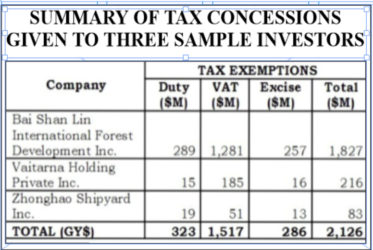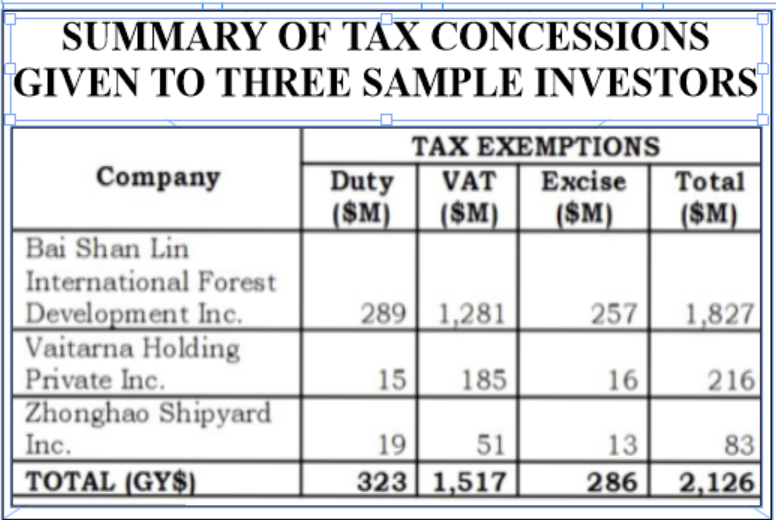Guyana did not benefit from over $2B in concessions that were granted to four investors, Baishanlin International Forest Development Inc, Vaitarna Holdings Private Inc, Diamond Tropical Wood Products Inc and Zhonghao Shipyards Inc, according to a forensic audit of the Guyana Office for Investment (Go-Invest), which has said that the failure to monitor such grants has made large scale abuse by investors likely.

The audit, which was commissioned by the government, has also concluded that Go-Invest “has failed to fulfill its mandate” over the course of its two decades of existence and is “plagued” by poor governance, mismanagement, no strategic plan, an absence of standard operating procedures and a lack of policy for investment agreements.
On the latter, the audit report states that senior management indicated that investment agreement proposals normally handed by Go-Invest were sometimes managed directly by the Office of the President under the former PPP/C administrations, including the recommendations of concessions.
It also notes that approval and denial of comparable investments highlighted that recommendations for concessions were not granted in a fair and transparent manner by Go-Invest. In fact, it says an examination of applications that were rejected showed inconsistency in the granting of concessions. (In one case that is highlighted, Dazzell Embroidery was not recommended because the type of business was never given a concession before, even though it was within Go-Invest’s remit.)
According to the report, based on a successful application by the investor, Go-Invest would prepare a draft investment agreement, which would be sent to the Guyana revenue Authority (GRA) for review. GRA would them submit the draft to the Finance Minister for approval, after which it would be returned to the GRA. The report states that the GRA would then send the approved agreement to Go-Invest indicating that the investor was required to apply to the Commissioner-General for tax exemptions on the list approved by the minister. However, it adds that all concessions that were granted under the former administrations could not be verified since the related documentation was not sent to Go-Invest. In fact, in some instances correspondence was addressed directly to the investor.
‘Abuse of concessions
The report notes that the role of Go-Invest under the Invest-ment Act of 2004, Section 39 or any other legislation related to Go-Invest does not require the agency to monitor the concessions granted to investors. “This has created the probability for large scale abuse of tax concessions by investors using supplementary Investment Agreements and the obtaining of concessions for products already received,” it states.
Nonetheless, it adds that Go-Invest failed to sanction Baishan-lin International Forest Develop-ment Inc, Vaitarna Holdings Private Inc, Diamond Tropical Wood Products Inc and Zhonghao Shipyards Inc for breaching their investment agreements.
The report cites Baishanlin’s commitment to setting up a wood processing facility at Concep-tion, Linden Highway. Up to September 30, 2016, it says no facility was set up and the company exported raw lumber without processing and expanded into other industries, such as mining, real estate and shipping.
Baishanlin was incorporated in Guyana in 2006, according to the report, and the main objective in its business plan was its utilisation of the of the country’s forest resources “to produce from its processing plant a wide range of finished products.”
Based on file information, after the initial investment in 2007, there were three renewals and six supplemental agreements between Baishanlin and Go-Invest. It was noted that there was another initial investment agreement for Baishanlin related to real estate, among other sectors, although there were suggestions from a Go-Invest officer that the second agreement was inconsistent with the agency’s policies.
“During the period 2007 to 2012 Bai Shan Lin was cutting and exporting raw lumber without processing it or creating value-added products. Bai Shan Lin benefitted from concessions totaling G$1.8B during the period under the review 2011 – 2015,” the report says. “Conces-sions were not monitored by Go-Invest since there was no system in place to identify the concession given, its value or whether it is abused/illegally. It is evident that Bai Shan Lin’s real objective was to export raw lumber,” it adds.
Vaitarna is also cited for failing to fulfil a commitment to set up a wood processing facility at Wineperu, in Region 8. Up to July 31, 2016, the facility was not engaged in “any significant production” of wood products, the report states, while concessions amounting to G$217M had been granted.
The company was incorporated in 2010 and the initial investment agreement catered for duty-free concessions for equipment and machinery for forest extraction and road building. The agreement was renewed in 2012 and a tax waiver was granted for sawmill equipment. However, while the agreement was renewed the following year, then Go-Invest Chief Executive Officer Desmond Mohamed instructed that no further renewals be granted unless there was compliance with the conditions of the initial agreement.
‘Political directive’
Another investor, Toolise Persaud subsidiary Diamond Tropical Wood Products Inc, the report says, was granted over G$60M in concessions to establish a wood processing facility but it never commenced operation at Diamond, East Bank Demerara.
It was noted that the company was granted concessions in August, 2012. In that same year, the report says that then Go-Invest CEO Mohamed, based on a political directive from then President Donald Ramotar, was advised by then GRA Commissioner-General Khurshid Sattaur to adjust an investor agreement with Diamond Tropical Wood Products Inc to reflect concessions for a Toyota Land Cruiser. The report adds that he was also advised that as the project progressed, consideration would also be given for concessions on an additional Land Cruiser and pick-up.
“Mr. Mohamed was advised to submit the adjusted IA for the Finance Minister’s approval. The investor was told by then CEO of Go-Invest, Mr. David Mohamed that two vehicles instead of four would be recommended. One for the commencement of the project and the other during operations. Mr. Mohamed reiterated that Go-Invest cannot recommend a 5-seater Land Cruisers since such vehicles do not fall within the guidelines for concessions,” the report states, before adding that Diamond Tropical Wood Products did not agree with the guidance from Go-Invest and had a meeting with Ramotar and Sattaur.
“…Mr. Mohamed by correspondence dated March 9, 2012 informed the Head of GRA that he could not comply since the President of Guyana had not given him any instruction. Mr. Mohamed was shortly thereafter reverted to his substantive job at Guyana National Shipping Corporation Ltd. Mr. Mohamed was succeeded by Mr. Keith Burrowes as CEO, the then Chairman of the Go-Invest [Board of Directors],” it adds.
Meanwhile, Zhonghao Shipyards Inc is cited in the report for also having breached its investment agreement, under which it benefitted from G$82.4M in concessions. The company had been set up to create a shipyard and build and repair both local and foreign vessels. The report says evidence suggests that the company breached the agreement, while noting that it was unable to access all the information because the entire file could not be found by Go-Invest staff.





